
**********Have a Nice Day**********
Remember:
The views expressed here are my own. In expressing these views, I am not speaking for Les Amis de la rivière Kipawa or Whitewater Ontario. The executive of these organizations have not vetted these comments and may disagree with the positions I take on issues, or the manner in which I choose to state them.
_____________________________
I realize that I am my own worst enemy at times. On the one hand I promote someone like Elizabeth May who is an unfailingly dedicated environmentalist and unfailingly polite. Someone who does not personally attack or villify people ever. She has accomplished great things in terms of environmental protection which is a legacy and will benefit future generations. Though she has dealt with villains in high places she has done so without ever calling them so and can mingle with everyone from presidents to tree planters. It doesn't matter, she always looks for the good in people and as a result people will always hear her out.
On the other hand I often come off as a self righteous blowhard at best and threatening at worst. Neither is likely to promote attaining the end goal.
It also has the effect of causing the people who should be listening to simply "tune out."
The folks at PWGSC have convinced themselves that what they are doing is in the public interest. I disagree.
Our job is to show that they were wrong, that they started this on the wrong footing and ended with a bad result. That requires an appeal to people's common sense and rationality.
As a rule we won't get there by degenerating the quality of our discussion and attacking people instead of arguments. All that causes people to do is become guarded that the person doing the name calling is not entirely rational.
People have been disappointed in the past by some of my judgment calls. I have been labeled a loose cannon and a liability. While well intentioned my passion overwhelms me and I become righteously indignant.
We are four months away from Les Amis' day in Court. Any future public statements concerning the Kipawa will only contain official text.
Wednesday June 20, 2007
Members of Les Amis including Chief Spokesperson Doug Skeggs, Jim Coffey, Francois Dieboldt and Peter Karwacki attended the Charles Lynch Memorial Conference Room at Parliament Hill to spotlight the actions of PWGSC which have caused the cancellation of the 21st annual and venerable Kipawa River Rally.
This letter was sent to Jeff Charlebois:
I received a copy of your letter to Doug Skeggs dated today asking Les Amis to change its public statement that Public Works and Government Services Canada has caused the cancellation of the 21st annual Kipawa River Rally.
On a personal note I feel it necessary to add that we, now a group representing a broadly based coalition of whitewater enthusiasts, river preservationists, and others concerned with the state of environmental assessments in Canada, neither intend to withdraw nor change our pubic statement. Further we will embellish it as necessary at our press conference tomorrow at the Charles Lynch Memorial Conference Room on Parliament Hill. PWGSC simply cannot proceed unchallenged. The line has been drawn in the sand!
We fully appreciate that our statement may bring PWGSC unfavourable public scrutiny. Please also understand that it is not something Les Amis would have desired. The situation created by PWGSC, is one we have worked tirelessly to avoid over the past 27 months.
.
Make no mistake, PWGSC’s actions forced Les Amis to cancel its 20-year-old community festival, a festival that has attracted thousands of tourists over the years from as far away as Australia into the Témiscamingue region, a festival that has provided tangible economic benefit to the local businesses. and two commercial rafting companies.
As a non-profit organization, run by volunteers, we are responsible for the safety of the people attending our festival. But the Festival also needs a threshold number of participants in order to be financially viable. When you denied access to the upper third of the River you reduced to the attractiveness of the river to the point where there would be so few participants that Festival would not be economically viable. You left us with no option but to cancel the event.
This is why we Les Amis shall neither retract nor change the public statement we have issued.
PWGSC seems to have taken adopted an adversarial towards Les Amis since 2005, when we, a legitimate user group on the Kipawa, questioned the environmental impacts of the Laniel Dam reconstruction project, specifically those affecting our navigation.
At every opportunity over the past 27 months, we have expressed our willingness to work with PWGSC towards make the Laniel Dam project a suceess for all parties. A new Dam could both preserve historic navigation rights as well as safely control the Kipawa Lake level.The Kipawa has a huge potential as a natural whitewater destination– the spillway design should enhance those qualities.
Every step of the way, PWGSC has disappointed us:
By forcing Les Amis, a non-profit volunteer group, to take legal action to defend our rights under law, rights that PWGSC was fully aware of even as it took aggressive and secret actions against us in an attempt to eliminate those rights without meeting its legal obligation for consultation or proper consideration.
By releasing a large amount of water from Lake Kipawa a week prior our 2005 festival, and then providing a significantly reduced flow for our event,
By undermining our historic, positive relationship with the local municipality
By not consulting with our organization and the paddling community on the design and implementation of measures taken for the stated purpose of mitigating the impact of the dam project on our activity (portage trails and shuttle services).
By demonstrating incompetence in the design of those “mitigations” (i.e a shuttle service that met no one’s needs, a ill-conceived portage trail that caused extreme inconvenience to rally participants at our 2006 event and resulted in a physical injury to one person).
By ignoring suggestions we put forward that might address serious inadequacies in the design and implementation of the above mitigations.
By misleading the public and the paddling community by continuing to state that navigation on the Kipawa River at Laniel is prohibited under the Canadian Dam Association guidelines and the Quebec Dam Safety Act—statements that PWGSC knows to be untrue.
By claiming that PWGSC’s efforts to remove historic navigation rights at Laniel are in the interest of public safety. At the same time PWSGC does not ensure the safety of its employees, its contractors and the public on the Laniel construction site (e.g. PWGSC staff on-site without legally required safety gear, a contractor working right next to the powerful chute through the gates of the Laniel without and life jacket, small children wear beach sandals being led across the entire construction site in full view security personnel.
By communicating with us, not through email, or by phone or in writing, but through a newspaper advertisement in May of this year, an ad that stated PWGSC’s intent to deny access to the entire top section of the Kipawa River during the 2007 festival, without any consultation with us on the impacts of this clearly illegal action.
Mr. Charlebois, we take personal offence in the last bullet above because even as PWGSC was publishing this advertisement, Mr. Skeggs was speaking to you on the phone expressing our desire to meet with you to work out any issues that might stand in the way of a successful 2007 festival.
I hope that PWSCG, perhaps with your help, may find a way to work with Les Amis cooperatively in the future.
Peter Karwacki


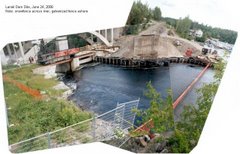


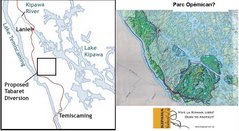

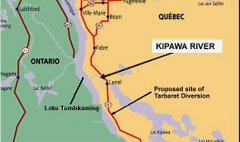

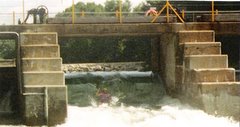





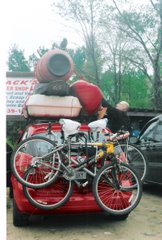

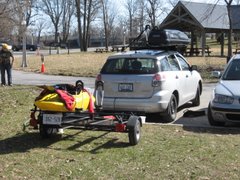

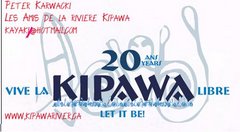
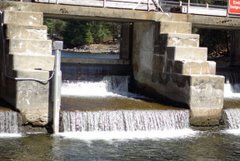


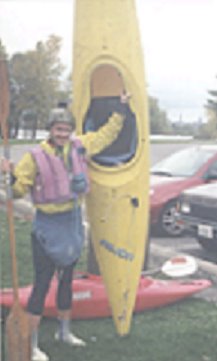



No comments:
Post a Comment